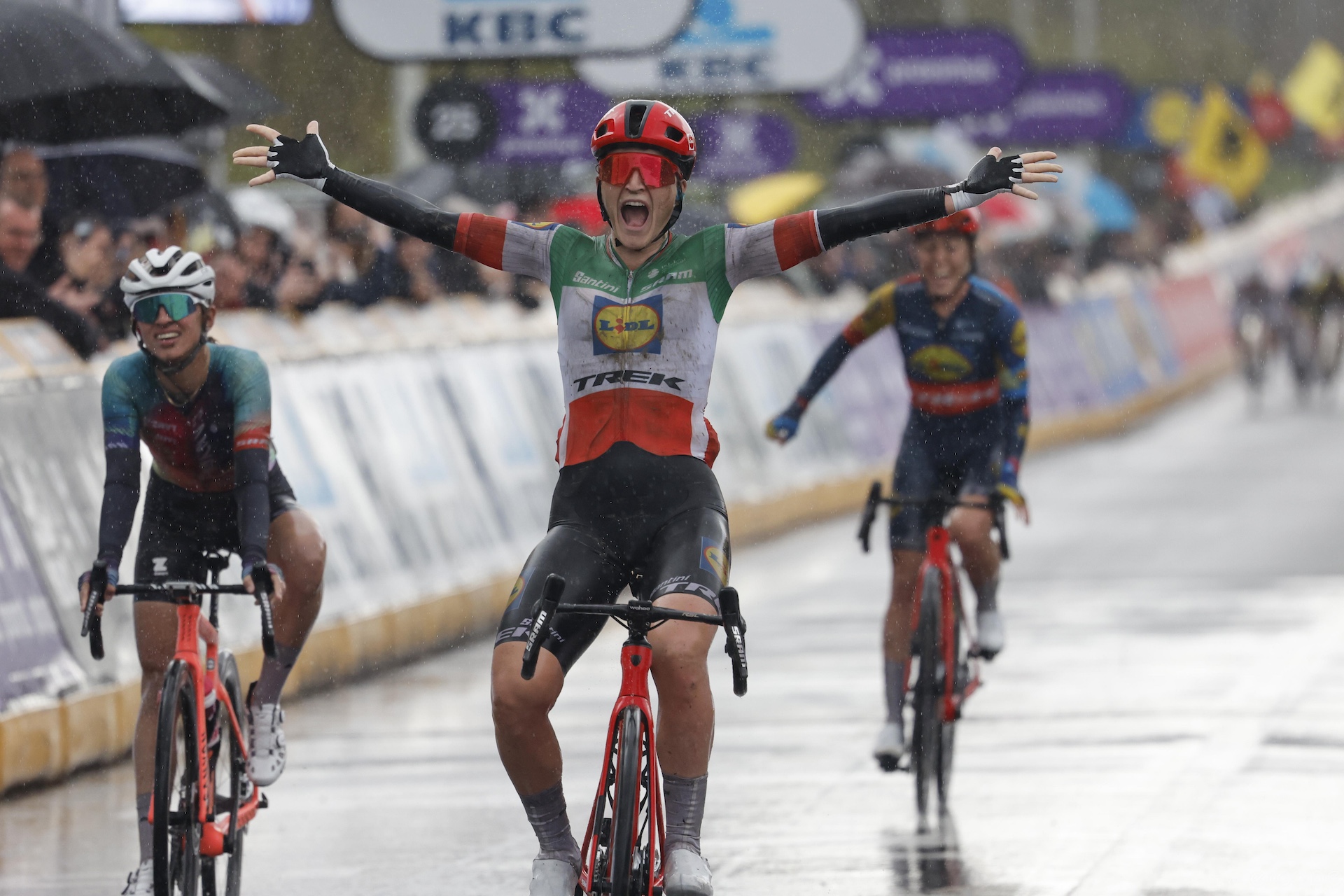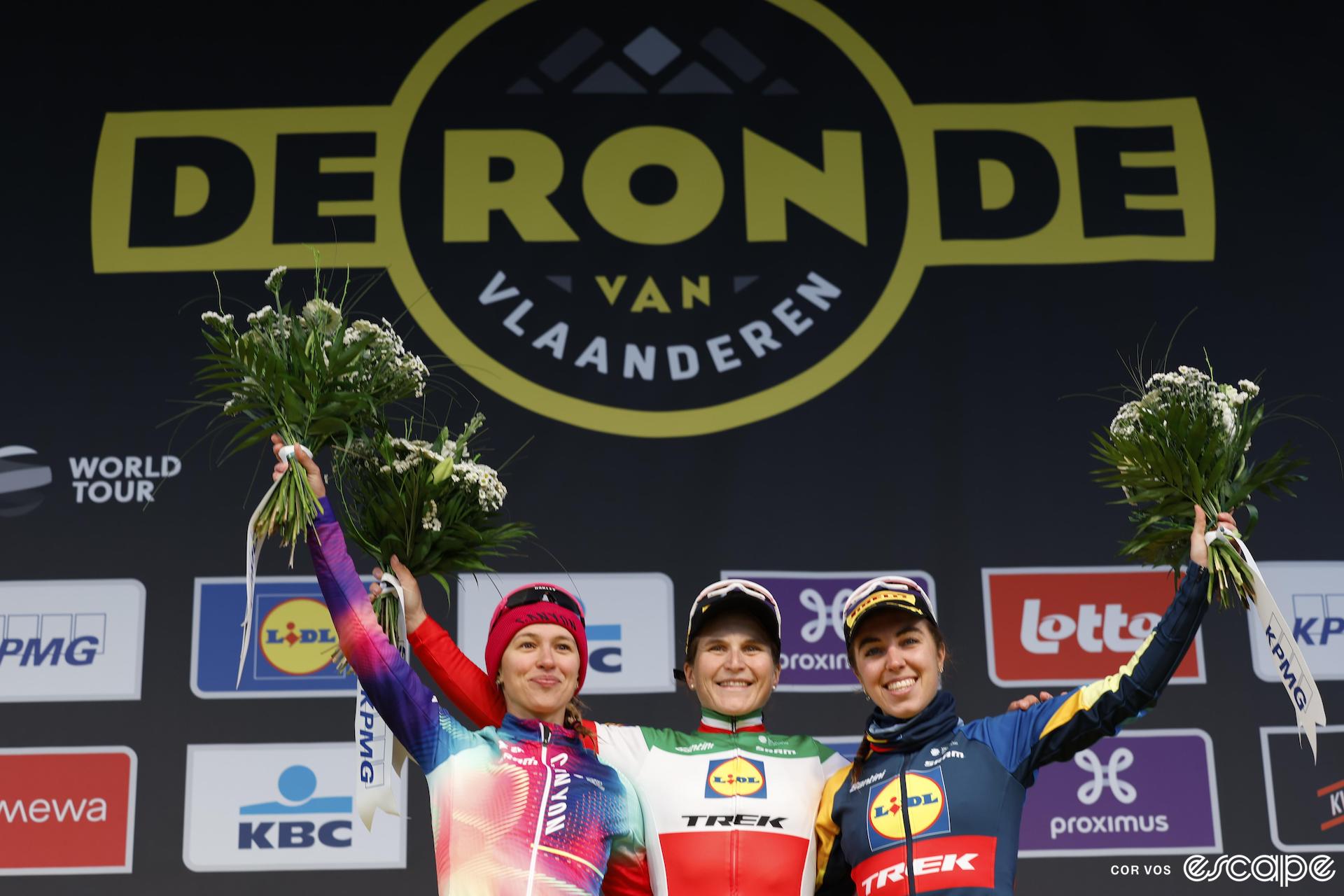Last year’s Tour of Flanders was emblematic of SD Worx’s season as a whole. Lotte Kopecky winning solo with apparent ease, Demi Vollering taking second in the small-bunch sprint behind. It was just one of 20 1-2s the team would amass for the year. Just one of many performances that showed the Dutch team had no equal.
Twelve months on, though, things feel markedly different. It’s not just that SD Worx-Protime fell short in today’s 2024 edition of De Ronde; it’s that the dominance they displayed so often last year hasn’t been nearly as evident this season. Lidl-Trek, meanwhile, rode the perfect race in what has been a glittering Classics campaign showing again that actually, yes, SD Worx-Protime can be beaten.
Kopecky started as the unbackable favourite – the local hero looking to win her third Ronde on the trot, this one in the rainbow bands. She even debuted white knicks for the occasion. But it wouldn’t be her day, nor her team’s. Kopecky fifth, Vollering eighth, Lorena Wiebes 11th, and Marlen Reusser in hospital with a broken jaw and damaged teeth after a horrible crash in the first 10 km of the day.
While Lidl-Trek also lost a rider in that early crash – Lizzie Deignan, with a broken arm – they had much more to celebrate this evening. Victory for Elisa Longo Borghini – her second at De Ronde, nine years after her first – and third place for Shirin van Anrooij, as both riders saluted in heavy rain to cap a masterful performance.

No moment typified Lidl-Trek’s brilliance more than Van Anrooij’s explosive surge with just over 20 km to go. Like Kopecky and Vollering, 22-year-old Van Anrooij had been distanced on the ever-decisive Koppenberg climb with 44 km to go, finding herself in a chase group behind eight leaders. Among those eight leaders was her teammate, Longo Borghini, who’d come back to the fore after an earlier crash.
Upon battling her way back to the front of the race, Van Anrooij blasted past immediately. The young Dutchwoman led the field up and over the Oude Kwarmont and then onto the Paterberg. It was there, on the day’s final climb, in the group behind, that Lidl-Trek made the second of its decisive moves.
“When I was on the Paterberg I heard in the radio from Jeroen Blijlevens, our team director, that I could also go [on the attack] because for us numbers mean strength,” Longo Borghini said later. “So I just went together like, really shoulder to shoulder, with [Kasia] Niewiadoma.”
Longo Borghini and Niewiadoma opened up a gap over the rest of the favourites (including Kopecky and Vollering who’d caught back on by then) and set off in search of Van Anrooij. The three joined forces with 12 km remaining, and with Niewiadoma willing to work with the two Lidl-Trek riders, it was soon clear that the trio wouldn’t be caught. “The cooperation was really good,” Longo Borghini said. “Much respect to Kasia for working with us.”
In the final sprint, there was a moment when it looked as if Niewiadoma had done enough to take the biggest win of her career. That was until a confident Longo Borghini hit the front.
“I was just so sure [I could] win the sprint,” she said later. “I just don’t know why because I’m normally like, not [a] very quick rider. But, you know, in these scenarios, when the race is long, and people are tired, what comes out is your efficiency and the freshest always wins and I felt quite fresh.”
The Italian’s win is a season highlight for a Lidl-Trek team that’s been deeply impressive this spring. Elisa Balsamo won Trofeo Alfredo Binda and Brugge-De Panne, Longo Borghini was second at Strade Bianche and third at Omloop Het Nieuwsblad, and Van Anrooij was second at Dwars door Vlaanderen earlier in the week amid several top-fives.
Those results are in contrast to last Classics season where Van Anrooij’s Trofeo Alfredo Binda was a shining light in an otherwise dark period for the team. Longo Borghini was sick, Balsamo and a bunch of others were out injured, and the team was frequently outmuscled by SD Worx.
“Last year, it was a very unfortunate time for us,” Longo Borghini told Escape after her victory today. “I think if we would not have had so many bad luck with injuries and sicknesses all season long, you would have seen the same as 2024.
“But yeah, let’s say that we’ve been very unlucky and now we are at our full potential. And we showed what we can do. Which is, I think, pretty good,” she added with a chuckle.
So what of SD Worx-Protime’s ride today? Were they just outgunned, or was there more to the story? The analysis out of the team camp post-race was that the infamous Koppenberg climb was to blame for the team’s woes. It was there that Kopecky and Vollering were both forced from their bikes as riders ahead lost momentum.
In a TV interview, Vollering suggested Niewiadoma was to blame. Kopecky wasn’t so specific. “In front they had to get off the bike and there’s just no space to get around them so then getting off your bike is the only option,” she said.
Vollering waited for Kopecky but the damage had been done. The lead group of eight had formed up the road, necessitating a big chase from behind. Getting back to the front would take a significant toll on Vollering and Kopecky.
“I thought ‘no panic, we come back’ but this cost us too much energy,” Vollering said. “It was shame because I think if we would be there in front of the race together then I think we could play a really good race. But we all did already too much. So yeah, we couldn’t go with Kasia and Elisa on the Paterberg.”
In Vollering’s eyes, missing out on the win many expected was a case of bad luck more than anything else. “If we didn’t have to get off the bike on that Koppenberg then we would be there and then I think it would be a totally different race,” she said.
In one sense she’s right – Kopecky and Vollering both having to walk on the Koppenberg certainly did impact today’s race. But that wasn’t simply bad luck. Neither rider was particularly well positioned coming into the climb, despite knowing it was a key moment in the race. Kopecky admitted as much later on. “I was not far enough in front for the Koppenberg,” she said. “That was partly due to circumstances because I was pushed a bit, but it was also partly my own fault.”
As it was, Kopecky already looked a little ways off her best, getting distanced on several climbs in the back half of the race; climbs she’d normally excel on.
This time last year there was a growing sense of fatigue about SD Worx’s dominance; a sense that the team’s strength was making the racing less interesting and more predictable than was desirable. Today though, and this spring more generally, there’s a very different feeling. A growing sense that SD Worx-Protime is indeed fallible; that an SD Worx-Protime victory at the biggest races shouldn’t be the default expectation any more.
Had things gone differently on the Koppenberg today, maybe Kopecky would have won. Maybe Vollering would have, or maybe even Wiebes. But that’s not how it went. Today, Lidl-Trek were rewarded for their positioning, their timing, their efficient use of resources, and their strength.
And so, after seven of this spring’s WorldTour one-days, the leaderboard reads SD Worx 3, Lidl-Trek 3 (Marianne Vos has the other win for Visma-Lease a Bike). That’s a far healthier, more balanced results sheet than at the same time last year, when SD Worx had five wins, and Lidl-Trek (then Trek-Segafredo) just one.
SD Worx-Protime might bemoan their fortune today and how the Koppenberg affected the result, but at the end of the day, the sport is better and more exciting for their fallibility.
Onward to Paris-Roubaix.
Did we do a good job with this story?

